|
Welcome to A&A. There are 18 full reviews in this issue. Click on an artist to jump to the review, or simply scroll through the list. If you want information on any particular release, check out the Label info page. All reviews are written by Jon Worley unless otherwise noted. If you have any problems, criticisms or suggestions, drop me a line.
|
|
|
A&A #255 reviews (July 2004)
������������������������������������� 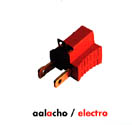 Aalacho
AalachoElectro (self-released) Aalacho is Nathan Scott. He's recruited a number of friends to stop by and contribute vocals or guitar or whathaveyou, but he's the one to blame for this fine collection of electronic noodling. Scott can't really decide if he's a fan of New Order, Die Warzau, faceless 70s German techno or any number of industrial acts. Industrial in an early Einsturzende Neubauten way, of course. Most of the time he borrows freely from all sorts of influences and then assembles the sounds into a vaguely sterile setting. That cool feel is what really sells this set for me. There's just no excess. Plenty of experimentation ("Ticket to Ride"--yes, the Beatles song--is utterly unrecognizable) but everything sounds so damned swell. A fun run-through of electronic trends of the last 30 years or so. Scott has a real handle on his sound, and he knows how to put songs together. Not exactly an album with ample commercial prospects, of course, but that simply makes it more pleasing to my ears.
Contact:
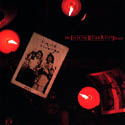 The Laura Blackley Band The Laura Blackley BandLiquid Courage (SBS Records) "Liquid Courage" means exactly what it sounds like, but the same saying could just easily describe Laura Blackley's voice. It's just the slightest bit husky, almost perfectly-formed for the sort of rootsy country-blues she plays so well. SBS Records is Michelle Malone's label, and Malone also produced this album. So it won't come as any surprise that Malone fans ought to find plenty here to love. The arrangements tend to provide one or two truly haunting moments per song without getting maudlin. Blackley herself sounds like a more rough-hewn version of Malone--reminds me of James McMurtry's first album, where he sounded like a much more weathered conception of producer-mentor John Mellencamp. I still listen to Too Long in the Wasteland a few times every year, and I think it's likely I'll put this album into my regular rotation as well. Malone does very well behind the boards, adding a few things when the songs pick up the tempo and stripping down the sound on the slower numbers. When it's most important that Blackley's voice come through without adornment, Malone shuts down everything. Her instincts are impeccable. Simply an exceptional album. Kind of a throwback to those great country-rock-blues albums of the late 80s--back before the more cutesy elements of today's Americana movement took over. Just the sort of thing that makes me crave a bourbon or three--just for the taste, of course.
Contact:
 Blessed Light Blessed LightLove Lights the Way (Mill Pond) Tres Big Star-y, focusing on the slower, more melodic bits. Quite electric, though, complete with some really nice keyboard/organ work. And so when the pieces occasionally wander down into blues territory, well, the whole thing falls together nicely. Like on "My Beloved," which is one of the more soulful rock songs I've heard in many an age. The guitar is a bit too clunky, but that provides just the right counterpoint to Toby Gordon's impassioned singing. One of those things that couldn't have been predicted--lucky accidents are truly blessed, indeed. Blessed Light rambles its way through the dregs of the 60s and 70s, and still manages to find the path to the new millennium. These songs aren't carbon copies of an ancient age. Rather, they take well-worn sounds and give them just enough of a modern spin to make them shine all over again. One of those albums that's perfect for a late afternoon beer or bowl. Hang out and let it all wash over you. Oh, my soul.
Contact:
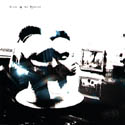 Blow
Up Hollywood Blow
Up HollywoodFake (self-released) The access to Blow Up Hollywood is minimalist at best. The liners almost don't exist. The web site is more confusing than anything else. There are these pictures everywhere, but there are no explanations. So screw it. Turn on the music. And all that was lost is now found. The music doesn't necessarily explain anything, but it sure does fill in the blanks--so much so that you don't even remember what your questions were in the first place. Blow Up Hollywood is definitely putting itself in the running as a truly "important" band. And while the music is overwhelming and astonishingly powerful, it really isn't pretentious. All that stuff I listed earlier? The vagueness of the web site, etc.? That might be taken as a bit precious, but the music is the thing. And Blow Up Hollywood's full-blown huge sound is a marvel to behold. The songs evolve slowly, taking on one idea after another without sounding forced. And when the summation arrives, it's like a revelation from beyond the veil. This is not happy summer music. It isn't bouncy, and it isn't peppy. At their fastest, the pieces are midtempo. The lyrics are generally downcast--though not pessimistic--and the orchestral arrangements produce an effect of ponderous grace. These guys might just be more "important" than they think they are.
Contact:
The Fucking Am Gold (Drag City) This would be the second collaboration of the Fucking Champs and Trans Am (the first one went by the name TransChamps, releasing the Double Exposure EP on Thrill Jockey back in 2001). It's pure Fucking Champs cheez-metal confection, processed through the Trans Am sci-fi machine. There are even actual songs with normal (as such) vocals. Amazing. And so, as another Van Halen meets the Allmans meets Uriah Heep meets Joe Satriani meets Frank Zappa meets Maiden song blows by, I ponder the thought of a universe without this music. And I get very sad indeed. There is, of course, the question of how well this music would work without its antecedents. After all, a lot of my attraction to this stuff is that I listened to the inferior original stuff as a child. Now that I am a man, I am able to handle the pure distillation of those ideas. But even now, my constitution can barely handle the power. Um, yeah. Whatever. This is utterly fun music, performed with verse and style. And I'm not kidding about the "inferior originals" crack. These guys are ace musicians, and their inclination is to take this sound where it has never been before. Which is just fine with me. And when you name your band "The Fucking" anything, well, it would seem obvious that you're not going for the Wal-Mart crowd. That's cool. Us cognoscenti will have to simply bask in our coolness.
Contact:
������������������������������������� 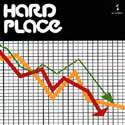 Hard Place
Hard PlaceHard Place EP (Antenna Farm) A three-piece that plays snarky, culture-snapping music that is most reminiscent of the late 70s output of Supertramp, Cheap Trick and David Bowie. Not exactly stiffs, are they? Hard Place lays down a hard line. The lyrics are exceptionally sharp and mean. The music is inspired by a very particular time and place--not exactly the sort of thing intended to be all things to all people. Let's be clear about this: It isn't. Rather, this is music for people who like music. People who understand the history of music and appreciate having their sensibilities vilified. People who can laugh at themselves with vigor. The line may be short, but the assemblage is most worthy.
Contact:
������������������������������������� 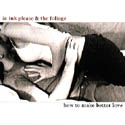 In Ink Please
In Ink PleaseThe Foliage How to Make Better Love split CD (Fall Records) Two male-female duos that specialize in well-crafted, moody pop. The sorta stuff that makes for a nice, contemplative evening. In Ink Please reminds me a lot of Floating Opera, but with somewhat more minimal arrangements. Often Fender Rhodes organ and guitar are the only instruments. The melodies are intricate but never jarring. The parts never stop moving, and that keeps the songs flowing well. The Foliage is much more fond of electronic accouterments in its arrangements, but otherwise the feel is similar to that of In Ink Please. There are plenty of layers within both the sounds and musical lines, and the pieces seem primed to withstand an almost infinite number of listens. These bands are a good match for a split--both bands are from North Dakota, even--and they both put some great work down for the set. A fine showcase for two solid duos.
Contact:
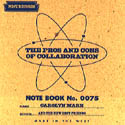 Carolyn
Mark and the New Best Friends Carolyn
Mark and the New Best FriendsThe Pros and Cons of Collaboration (Mint) Carolyn Mark tries too hard. She really does. The first track on this album, "The Overture," really is an overture. It sounds like the Dixie Dregs trying to encapsulate 70 years of country music in just more than two minutes. The thing is, she succeeds. As best you can given the constraints of the assignment, of course. Mark plays conceptual country (if you can think of a better description, send it this way), and sometimes her concepts are almost impossible to flesh out. She revels in tweaking music conventions and refuses play anything perfectly straight, which is why some folks find her, well, annoying. Not me. But then, I'm one of those dorky music critic types who likes to think about music almost as much as I like listening to it. Which isn't to say that this album isn't an utter blast. It is. But Mark refuses to stick to a groove. Rather, she dances circles around the expected, obstinately avoiding the easy solution. Which is cool, but not always smooth and pleasing. Mark is an acquired taste, and I picked mine up years ago. This is her most accomplished album by far, and I think the pieces fit together a bit better as well. As well as possible when you're dealing with a genre polymath like Mark, anyway.
Contact:
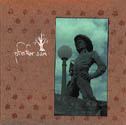 Pfeifer Sam Pfeifer SamThe Flower Garland School (23 Productions) Handmade jacket, and what looks to be hand-written (as in, every jacket is different) liner notes. Okay, so only 500 of these were pressed. You want to write out two pages of notes 500 times? That's freakin' devotion, man. And Pfeifer Sam is devoted to its music, which is a mixture of grand pop and noise--kinda like the Lips, but without any of the orchestrations. Or, shall we say, modern Lips songs with Hear It Is production style. Dirty, but oh-so-cleverly so. The songs themselves fade in and out of consciousness--there aren't many beginnings and ends as such. This is more of an experience than an album, but the tour guides are exceptional. The sort of album that doesn't wander past every day. Pfeifer Sam is still working out what it really wants to do, but this rest stop along the way is most invigorating. Don't just wiggle your toes in the shallows; dive right in.
Contact:
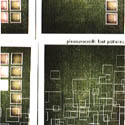 Pleasurecraft PleasurecraftLost Patterns (self-released) Proving that the 80s are still worshipped in Seattle, Pleasurecraft cranks out an album that reminds me of nothing less than Get Ready, New Order's masterful 2001 album. The press notes that Pleasurecraft doesn't leave the guitars behind, and it's that devotion to the electronic and the electric that makes this such a fun album. Well, and those up-and-down 80s beats, of course. Pleasurecraft can get away with such pedestrian rhythms because the rest of its sound is so complex. In fact, getting really freaky with the drum machines would have distracted from the rest of the music. The sound is sometimes sterile and sometimes shockingly organic. Think of it as electronic in the real. I'm not sure how this all plays out live, of course, but it is most engaging on this disc. Solid, unpretentious pop music. Pleasurecraft lives up to its name in every way. This is, indeed, a first class ride to good times. And then some.
Contact:
������������������������������������� 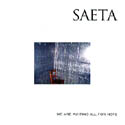 Saeta SaetaWe Are Waiting All for Hope (self-released) I was hanging out in Albuquerque the other day talking to a cello player, and I remarked that cello rock was a coming thing. It was kind of a joke, but there are a number of bands that utilize cello as an integral part of their sound. Saeta, a most unusual guitar-piano-cello trio, is one of the most striking. In some ways, the music isn't all that surprising. The folks picked two covers for this album--"Grand Canyon" from the Magnetic Fields's 69 Love Songs and the Smiths's "Last Night I Dreamt that Somebody Loved Me"--which fall right into the band's strengths. Not the fact that the songs are moderately overwrought romantic songs written by gay icons, of course, but simply intricate pieces of music that lend themselves to a sense of drama and the judicious use of strings. Or am I falling all over myself here? Probably. Albini did the production again, and this is yet another stellar job. The man isn't about noise, he's about sound, and this album sounds great. In particular, the weaving of the acoustic guitar, cello and piano--sounds which don't always work well together--is impressive. Albini manages to keep the core sounds of each instrument at the fore while not overshadowing any other element. This may sound simple, but it really isn't. Beautiful. Simply. Without adornment. A delight for the ears and the heart. All that and gunches more. Saeta is part of a group of interrelated bands along with Ms. Led, Rope Inc. and Roxy and Clark. All are pretty damned good, and this album continues that string of success. Most impressive.
Contact:
������������������������������������� 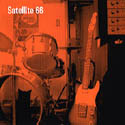 Satellite 66
Satellite 66Grasshopper (Smokeylung) This is still Josh Seib's outfit, and while it's been a while since we last heard from Satellite 66, the music is still as involved and engaging as ever. Seib has traveled through the likes of Brando and Marmoset, and he applies a similar noisy art of pop to his own tunes. The production here leaves soft edges everywhere in the sound, but the lyrics always cut straight to the bone. Clever bit, that is. I like the way these songs always keep moving. There's a graceful old-school country feel to the rhythm of these songs--not anything particular, but rather the way that these mid-tempo songs manage to sound eminently danceable. Two-step or whatever, the movement is constant. And the songs keep quietly impressing. Not the longest of affairs--eight songs in 24 minutes--but more than enough to ramp up my jones for more Satellite 66. This one snuck up on me...even though I was fully prepared to receive greatness. Kinda cool that way.
Contact:
������������������������������ 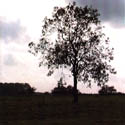 Second Thought Second ThoughtPurlieu (Second Thought) It's a little strange that a record label is named after an act, but when Second Thought the band is Ross Baker and Second Thought the label is run by the same Ross Baker, well, I suppose you're entitled. Even stranger, though, is that Baker used to record under his own name before adopting the Second Thought moniker back around 2000. Anything might seem strange, however, until you hear the music. Then reality takes its leave completely. I've always used the term "soundscape" to indicate that than artist has created his or her or its own rules and then made music that fits those rules rather than the humdrum Newtonian physics and Einsteinian special relativity under which we exist. Baker changes the rules on just about every piece, lending to an intensifying sense of unease as the electronic journey of this album rumbles on. This stuff is experimental, but each piece does adhere to one or two central tenets. Taken individually, each makes sense in some warped way. Taken as a whole, I'm not sure what to make of it. And that's cool. A sense of mystery is always appreciated in these here parts. Often enthralling and always intriguing, Purlieu ducks its head into some of the darker corners of modern electronic music. Baker refuses to stick to any particular style or feel, and that impresses me all the more. Quite the ride.
Contact:
������������������������������ ������������������������������������� 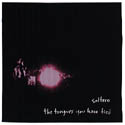 Soltero
SolteroThe Tongues You Have Tied (Three Ring Records) Soltero is Tim Howard and whoever he invites to play along on any particular song or tour. The comparisons on the press stuff mention the likes of Leonard Cohen, Johnny Cash, Neil Young, Pavement...heavy hitters, man. I suppose the Pavement or Silver Jews references are probably most apt, but Soltero has too many hallmarks of the idiosyncratic one-man band to really fit in anywhere. This is intricate alt-pop with plenty of allusions to country (of the alt. sort, of course), indie rock, 60s pop and whatever else pops into Howard's head. It's that unpredictability and sonic instability that draws me to these sorts of mutant outfits. Bands have to be democratic, and they often smooth out some of the rougher edges--edges that often ought to be dulled. That isn't the case with something like Soltero, and I must say I like getting cut now and again. The sound is very much that late 80s indie rock sound, bass heavy with a wee bit of shimmer. It's rough, but not quite raw. Lots of echo in the overdubs. Just about perfect for songs like these. I'd like to add one more obvious reference: Half Japanese. Howard is a much better musician and singer than Jad Fair, but both manage to create this feeling of imminent danger that makes their songs addictive. Slide in and be electrified.
Contact:
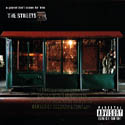 The
Streets The
StreetsA Grand Don't Come for Free (Vice/Atlantic) Where Original Pirate Material was smooth and styled, Mike Skinner has decided to give the finger to making easy, accessible bits. The songs here are disjointed and fractured, almost unlistenable at times. But what still comes through is Skinner's scathing analysis of pop culture and life in general. When I call these songs fractured, the beats are chopped and diced to create that effect. This isn't matter of incompetence; rather, it is one of intent. Take "***Not Addicted***," which has some really catchy beat work in it. It's just that the bass, rhymes and accompanying sounds don't really match up. Every once in a while Skinner screws up and actually drops into the groove, but he's quick to leap off as soon as he realizes his mistake. If anything on this album is a mistake, of course. Skinner's work is some of the most calculated and intensely designed in all of hip-hop, so maybe his occasional "slips" into normalcy are designed to keep people like me off balance. Of course, I happen to think that the off-kilter beat work, song construction and rhyme structure is a daring stroke. It doesn't work all the time, but I'm happy to hear that success hasn't spoiled this boy yet. Ach, what a cheesy reference. I guess that's fitting. It seems Skinner is having an awful lot of fun playing the anti-star. As long as he doesn't get too caught up in himself, that's cool with me. A somewhat surprising follow-up to a monster success, but one that might well set up The Streets for the long run.
Contact:
Also recommended: Atomsmasher All Around the World
(Rock Room Records)
Matt Boroff Matt Boroff (Lo-End)
The Claudia Malibu Star (self-released)
Rachel Goswell Waves Are Universal (4AD/Beggars Banquet)
The Green Pajamas Essence of Carol (Luna Music)
Jesse Kates Sleight of Hand (Rotary Dial Records)
No Doctors Hunting Season (Go Johnny Go)
Barry O'Brien Spark EP (self-released)
Pants Yell Songs for Siblings (Asaurus)
The Paper Champions Weekend of Compromise (Reason Y)
Pardovart Weapons of Mass Destruction (self-released)
The Remedy Session The Remedy Session (Redemption)
Ruth Ruth Right About Now (Flaming Peach)
Jean-Pierre Saccomani The Four Seasons (MCP Productions)
The Smugglers Mutiny in Stereo (Mint) ������������������������������������� | |
return to A&A home page